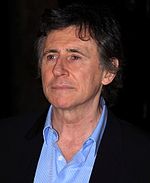
Gabriel Byrne
Irish actor
Iosif Aleksandrovich Brodskywas a Russian and American poet and essayist. Born in Leningradin the Soviet Union, Brodsky ran afoul of Soviet authorities and was expelledfrom the Soviet Union in 1972, settling in the United States with the help of W. H. Auden and other supporters.
Table of Contents
Iosif Aleksandrovich Brodskywas a Russian and American poet and essayist. Born in Leningradin the Soviet Union, Brodsky ran afoul of Soviet authorities and was expelledfrom the Soviet Union in 1972, settling in the United States with the help of W. H. Auden and other supporters. He taught thereafter at Mount Holyoke College, and at universities including Yale, Columbia, Cambridge, and Michigan. Brodsky was awarded the 1987 Nobel Prize in Literature “for an all-embracing authorship, imbued with clarity of thought and poetic intensity”. He was appointed United States Poet Laureate in 1991.
According to Professor Andrey Ranchin of Moscow State University, “Brodsky is the only modern Russian poet whose body of work has already been awarded the honorary title of a canonized classic… Brodsky’s literary canonization is an exceptional phenomenon. No other contemporary Russian writer has been honored as the hero of such a number of memoir texts; no other has had so many conferences devoted to them.” Daniel Murphy, in his seminal text Christianity and Modern European Literature, includes Brodsky among the most influential Christian poets of the 20th century, along with T. S. Eliot, Osip Mandelstam, Anna Akhmatova (Brodsky’s mentor for a time), and W. H. Auden (who sponsored Brodsky’s cause in the United States). Irene Steckler was the first to categorically state that Brodsky was “unquestionably a Christian poet”. Before that, in July 1972, following his exile, Brodsky himself, in an interview, said: “While I am related to the Old Testament perhaps by ancestry, and certainly the spirit of justice, I consider myself a Christian. Not a good one but I try to be.” The contemporary Russian poet and fellow-Acmeist, Viktor Krivulin, said that “Brodsky always felt his Jewishness as a religious thing, despite the fact that, when all is said and done, he’s a Christian poet.”
Life – the way it really is – is a battle not between Bad and Good but between Bad and Worse.
Russian-American poet (1940-1996)
For a writer only one form of patriotism exists: his attitude toward language.
Russian-American poet (1940-1996)
A language is a more ancient and inevitable thing than any state.
Russian-American poet (1940-1996)
I do not believe in political movements. I believe in personal movement, that movement of the soul when a man who looks at himself is so ashamed that he tries to make some sort of change – within himself, not on the outside.
Russian-American poet (1940-1996)
How delightful to find a friend in everyone.
Russian-American poet (1940-1996)
Man is what he reads.
Russian-American poet (1940-1996)
Cherish your human connections: your relationships with friends and family.
Russian-American poet (1940-1996)
Life is a game with many rules but no referee. One learns how to play it more by watching it than by consulting any book, including the holy book. Small wonder, then, that so many play dirty, that so few win, that so many lose.
Russian-American poet (1940-1996)
It is well to read everything of something, and something of everything.
Russian-American poet (1940-1996)
Who included me among the ranks of the human race?
Russian-American poet (1940-1996)
For boredom speaks the language of time, and it is to teach you the most valuable lesson of your life – the lesson of your utter insignificance.
Russian-American poet (1940-1996)
The poetic notion of infinity is far greater than that which is sponsored by any creed.
Russian-American poet (1940-1996)
After all, it is hard to master both life and work equally well. So if you are bound to fake one of them, it had better be life.
Russian-American poet (1940-1996)
Snobbery? But it’s only a form of despair.
Russian-American poet (1940-1996)
For the poet the credo or doctrine is not the point of arrival but is, on the contrary, the point of departure for the metaphysical journey.
Russian-American poet (1940-1996)
Every individual ought to know at least one poet from cover to cover: if not as a guide through the world, then as a yardstick for the language.
Russian-American poet (1940-1996)
Poetry is rather an approach to things, to life, than it is typographical production.
Russian-American poet (1940-1996)
What I like about cities is that everything is king size, the beauty and the ugliness.
Russian-American poet (1940-1996)
Bad literature is a form of treason.
Russian-American poet (1940-1996)
This is the generation whose first cry of life was the Hungarian uprising.
Russian-American poet (1940-1996)
The real history of consciousness starts with one’s first lie.
Russian-American poet (1940-1996)
It would be enough for me to have the system of a jury of twelve versus the system of one judge as a basis for preferring the U.S. to the Soviet Union. I would prefer the country you can leave to the country you cannot.
Russian-American poet (1940-1996)